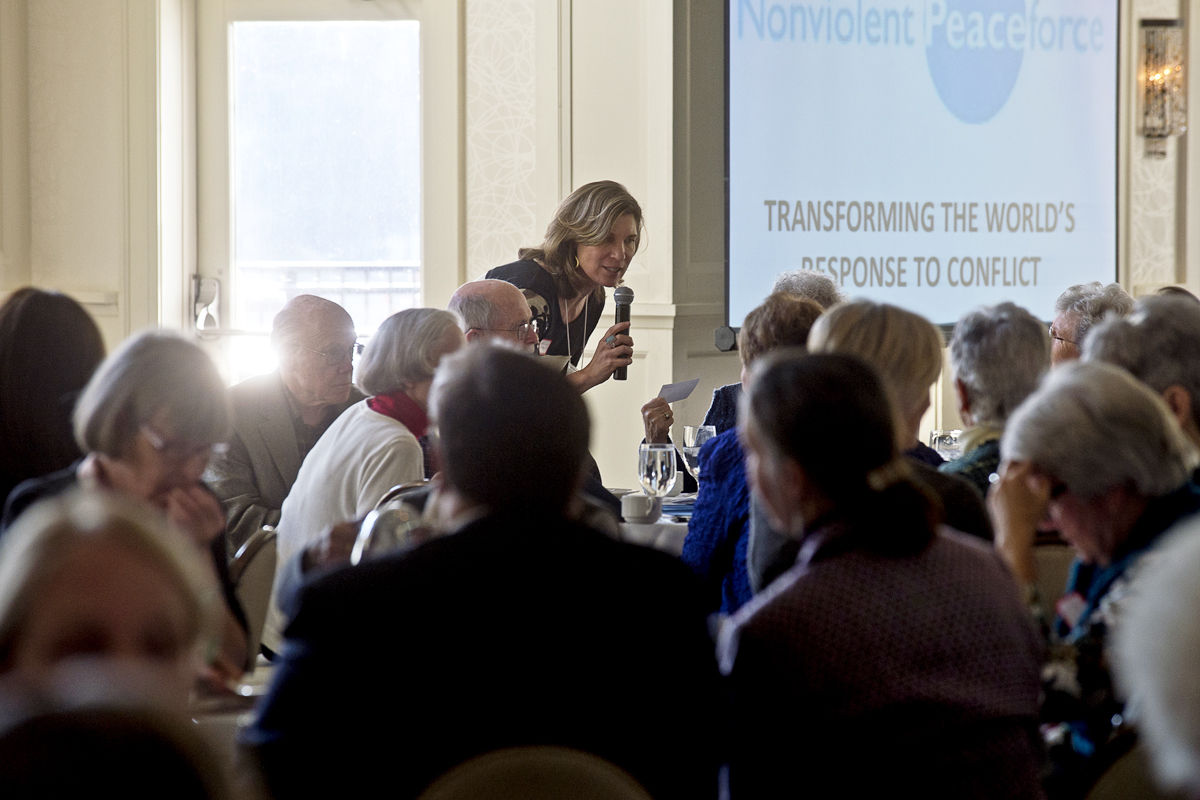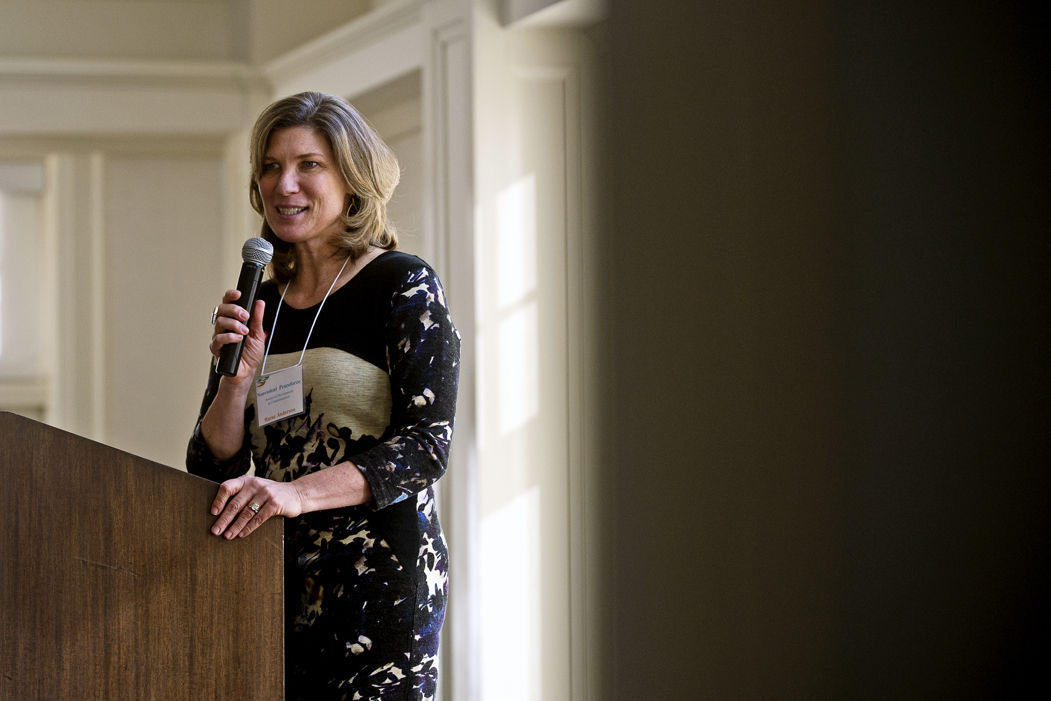Nonviolent Peaceforce seeks to transform world's response to conflict
Press Clip Source: Midland Daily News
Date: February 29, 2016
Written by: Matthew Woods
Read original article: Here
 “I expect many of you have never heard about the Nonviolent Peaceforce until you received your invitation,” Paula Liveris said to the packed room at the Midland Country Club this week.
“I expect many of you have never heard about the Nonviolent Peaceforce until you received your invitation,” Paula Liveris said to the packed room at the Midland Country Club this week.
A large group of people from Midland and points beyond gathered for tea, and to hear about what the organization that is doing its best to bring resolution to conflicts around the world — without weapons or violence.
The event, entitled “Transforming the World’s Response to Conflict,” was hosted by Jeanne Schaller, chair of the Midland Chapter, and Paula Liveris. The event featured a special visit by Marna Anderson, the group’s director of development and communication. The Midland chapter meets four times a year.
The group is unique in the world of other conflict resolution organizations as its focus is to train its field members to resolve conflicts in war and civil war zones, all without the use of weapons or the proliferation of more violence. The organization has been in operation since 2002, first working in India. It also holds a consultative status with the United Nations Economic and Social Council.
The organization only enters a conflict when invited, and takes a non-partisan role in conflict situations.
Currently, teams working in the Philippines, Myanmar, the Ukraine and in South Sudan, which is the largest project with about 200 peacekeepers in the field there.
Liveris said she joined the effort at the invite of Schaller, who has been working as part of the Midland Chapter for a few years.
Liveris told the group her story of assuming the role of a refugee woman as part of a recent immersion exercise.
“I assumed the identity of a Muslim woman, 63 years of age, illiterate, widowed and with no funds. I was just a refugee for 75 minutes. In that time, I was stripped of everything I owned: my dignity, my self-worth,” Liveris said. “We were bullied, we were intimated and we were raped. Yes, a 63-year-old. Forget about access to medication or a sustainable diet. It was horrific.”
Liveris said although the event lasted just over an hour, she saw a glimpse into the lives of people who find themselves victims of war and armed conflicts.
“We women in the simulation, we had never met before. We were taken in to a tent and we held hands and we shook and we held each other like babies,” she said. “At the end of the simulation, the perpetrators of our fake nightmare sat us down and explained that what we had just experienced was a duplication of their personal experiences in such camps.”
Liveris said the current war in Syria continues to create refugees at an alarming rate.
“It is estimated the Syrian war will increase the number of people living in camps to roughly 58 million this year,” she said. “There is only one solution to this horrific state of conflict — stop the fighting. But how?”
Liveris challenged the audience to become part of the bigger solution, and help train the next generation of field teams.
“It costs roughly $45,000 to put a peaceful worker in to the field in Sudan at the moment,” Liveris said. “We Midlanders can galvanize our strength and over a period of time raise enough funds to say yes as a community.”
Schaller said she was happy to see the room so full of people wanting to learn about the Nonviolent Peaceforce, and what they could do to help with their mission.
“I thank you all for coming,” Schaller said. “Its wonderful to see faces that I know and faces that I do not know. I am just delighted to have you here together and to listen to Marna’s stories.”
Anderson said she had been visiting with community leaders and students in the area during her visit.
“I’ve had a busy few days but it has been so much fun getting to know the people in this community,” Anderson said. “You can sense when a community cares about one another and that has been evident in addition to caring about the global community. That is really a gift that you have and I hope that you recognize that and cherish that and are grateful for that because it is really something special.”
Anderson brought a very good piece of news to the meeting.
“The American Friends Service Committee has just nominated the Nonviolent Peaceforce for the 2016 Nobel Peace Prize,” Anderson told an excited audience.
After a video presentation about the history, impact and ongoing mission of the group, Anderson spoke on the increasing reach of conflict into the daily lives of civilians in war torn regions.
“About 60 million people in the world are displaced because of war (and) 1.5 billion people are living in countries with epidemic violence,” she said.
Anderson said war has an impact on more people far beyond those who pick up arms and fight, and as war has evolved, so has that impact.
“In 1900 for a common battle, if you lost 90 soldiers, you are going to lose 10 civilians,” she said. “If you fast forward about 100 years, for every 10 soldiers that are lost in battle, 90 civilians die.”
She explained that even if people are not killed in a war zone, their means of sustenance and industry are often disrupted or destroyed, like the loss of livestock and crops.
Anderson said there is a toll beyond loss of life in world conflicts, especially for women and children. She cited conflicts in Sudan as an example.
“About 85 percent of Sudanese women have experienced sexual violence,” Anderson said.
She said that the Nonviolent Peaceforce has been giving “protected patrols” to women in that area, who often experienced gang rape and other violence while fetching firewood and water.
“We’ve done over a thousand accompaniments in the last year, and there hasn’t been one rape or sexual assault during that time,” she said.
Children in many of these conflicts are often forcibly recruited as child soldiers, ripped from their families and forced in to a life of violence,” Anderson said.
She said the organization works to support those groups that have taken a stance against violence in their own countries.
“We need to remember that in all of these places where there’s conflict, there are people that are working hard, and they are trying to find that way to stop that violence ... they are trying to find a way to stop that violence,” she said.
Anderson said about 40 percent of the peacekeepers are women, with the remaining 60 percent being men. She said the organization works hard to recruit members from within conflict areas, to keep a continuity in the area when the group has to move on.
Anderson left the group with a story about a meeting with a delegate and a general from the Moro Liberation Front in the Philippines. When asked if he would abide by a peace agreement, his answer was surprising.
“War is our last resort ... because we have seen with (the) Nonviolent Peaceforce, that it works,” the man said.

